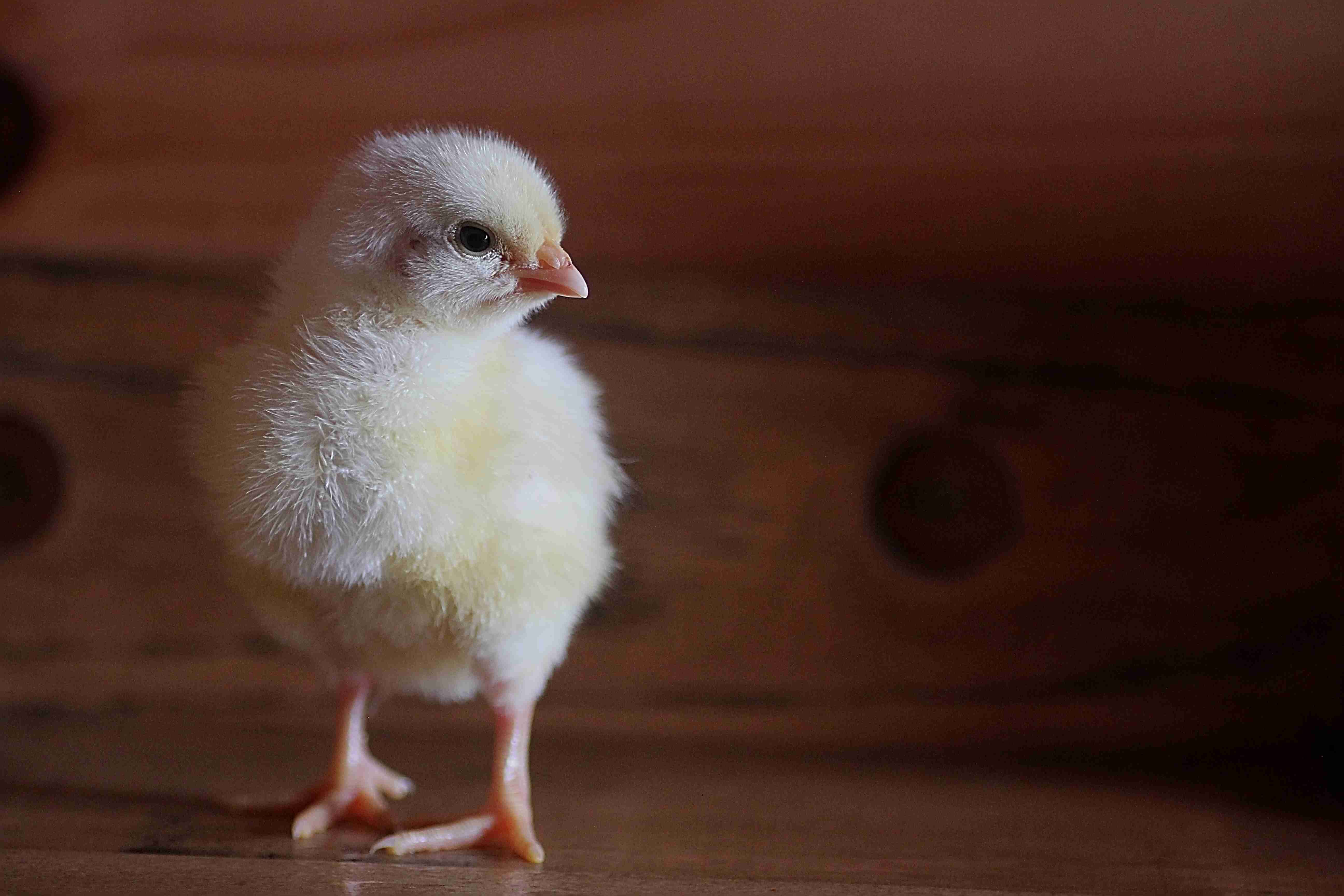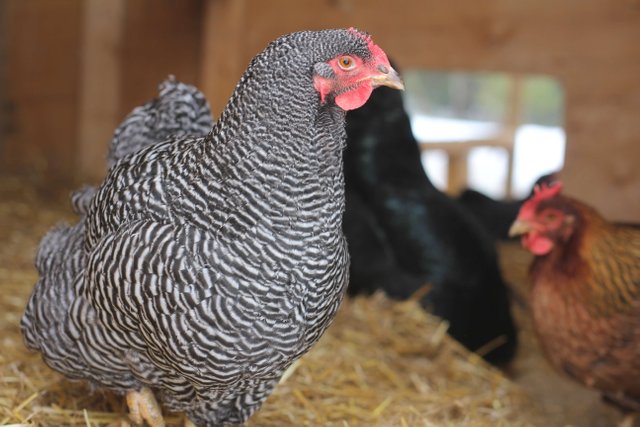The Complexities Of Raising Hybrid Chickens

These adorable chubby chicks are Lohmann Broilers. Broilers are basically the roosters that have been separated out from the layers. This breed was developed in Germany. At two days old they weighed about 2 ounces and were already demonstrating their famous insatiable appetites. I think if we had let them they actually would have eaten themselves to death.
What Is A Hybrid Chicken?
Hybrid Chickens are basically “high performance” chickens, produced by crossing a number of breeds in order to obtain specific desired traits. Much of this work is done in a laboratory where the genetics are patented to control profits. Commercial chickens are developed to deliver extra meaty breasts and accelerated egg production. These qualities are desirable, however, these genetic alterations are often attained at the expense of the well being of the animal. Also, much like GMO seeds, hybrid birds don’t breed well so you end up buying new chicks every time you want to raise meat birds or expand your egg laying flock.
Are Hybrids Really All That Bad?
This was our first venture with hybrid chickens. If you want to know why we selected the Lohmann over the Cornish X. Leghorn or other hybrid variety it was because that was the only option that our feed store offers. They are hatched locally and we figured the less travel and stress they have to endure the better. The reason we chose to try as hybrid rather than sticking with heritage chickens was to experience raising them. I am very "pro heritage" and someone called me on the fact that I really should walk the walk before having such a firm opinion. So I did.
Daily Observations & Controlling Feed
As I mentioned earlier these chickens have insatiable appetites. They also drink a LOT of water. I spent a lot of time cleaning and changing their wet bedding. We had them on a controlled diet with feeding's spread out through the day. The reason we chose to control their food consumption was to prevent leg issues. Hybrids are famous for becoming too heavy for their legs to support and they develop issues like "splay leg" which basically means they are crippled. We figured we could prevent this from happening but in the first ten days we lost eight this way.
Fascinating
It is fascinating to watch the growth and development of a hybrid chicken. The changes happen so quickly that it's almost like you can simply stand there and watch them grow. Here's what they looked like at eight days old. The first photo in this post was taken at two days old.
Leg Issues
Unfortunately with rapid growth comes some potential for serious disfigurement. I would see one dragging itself across to the feeder and we would have to give it the mercy of a quick death. I found this terribly upsetting. We were doing all of the correct things to prevent this. Avoid overcrowding, clean bedding, rationed feed and so on ... I just don't like to see an animal suffer.
Hybrids In A Pasture
We kept the chickens in a pasture with shelter and hoped they would move around a bit and exercise and stay healthy. They enjoyed basking in the sun but their main choice for exercise was moving from the food to the water which we intentionally spaced far apart so they would have to move around. The hens were in an adjoining section of the pasture and would squawk and bicker at their new neighbours trying to get their attention but the hybrids were completely oblivious to the hooligans next door. I hoped that they would enjoy foraging like the hens do every day but other than the occasional peck they weren't that interested. These are strange birds indeed.
The benefits
- Hybrids produce heavy breasts and more meat than a heritage chicken
- The meat tastes more like what most people have become accustomed to
- Grow rapidly. Many are ready to process at eight to ten weeks
- They can be very economical to raise
- Baby chicks are inexpensive to purchase
- They are far more sturdy and independent at birth than heritage chickens
The Negatives
- Not suitable for backyard breeding. Genetic make-up is complicated
- Must buy new chicks each time (not sustainable)
- Higher mortality rate (can reach around 10% of the flock)
- Lack natural instincts for avoiding predators
- Poor foragers, they rely on you for all food
- Careful feed management is necessary. Insatiably hungry
- Day-old chicks are sprayed with a cocktail of vaccinations
- They don't perch & and are hard to keep clean
Processing the Birds
Anyhow. We took the chickens to the local Jolly Farmer to have them processed and we received back 30 beautifully packaged whole chickens ready for the freezer. We raised them on organic feed and when all was said and done we saved money and stocked up the freezer for winter.
If you are wondering why we didn't butcher them ourselves the answer is that I didn't want to do it. I am the lone vegetarian in my family. I've had this affliction for decades. I just could not see my way to butchering and processing 30 of these birds. I've been part of the life and death cycle around here. We've slaughtered our pigs, a few roosters and such so it's not that I don't take responsibility for the animals that we raise but butchering them is just too much for me. We've all got our limits I suppose.
Will we raise them again? What are the alternatives?
I think we might give it a pass for now. We have some Barred Rock hens and they are quite a large bird. They are known as a dual purpose breed so we could get a rooster and start breeding them. This would offer far more self sufficiency than having to buy new chicks each year. There are a variety of dual purpose heritage birds to choose from: Wyandotte, Welsummer & Rhode Island to name a few.

In conclusion, hybrid chickens are not for everyone. For those that it doesn't suit, there are options. Each of us has to weigh the benefits and decide for ourselves if these creatures have a place in our life. I find the idea of science altering the DNA of a creature for our benefit quite reprehensible yet for better or for worse these chickens are here to stay. They surely had a better life on this homestead than they would have in a cage but the truth is, I am not sure that these particular chickens would have cared either way. I like to think that the sunshine on their faces gave them pleasure.
We are living in strange times. I wonder what my grandmother would have thought of these birds? Do you raise chickens for meat? What varieties do you prefer?
Thanks for reading!
Charlotte
Follow me @walkerland
All photographs are property of @walkerland
If you liked this you might also enjoy:
The Homesteader's Food Rebellion
Feed Your Mind Body and Spirit With A Garden

We are planning on processing some roosters soon. I wish our local processors did chickens. Unfortunately, they don't so this will be up to us. Your babies look very healthy, despite your report of problems. This is a good post. Thanks for sharing!
I think if my husband wants to keep raising chickens for meat we will have to invest in the equipment and do it ourselves. I won't like it but ...sometimes you just have to suck it up and do what needs doing right? Paying someone else to do it really cuts into the overall value. Thanks for the kind feedback, I appreciate it! :)
We are in the process of building a shelter and a pen so as to keep chickens safe from predators, namely dogs and coyotes. We are going to be gong with heritage chickens just for the reasons you mentioned in your post. I am looking forward to having our own eggs and meat.
A secure shelter and outdoor area will definitely save you a lot of stress and heartache. It's well worth the extra effort. Heritage chickens are truly lovely. We've always had a mixed flock and it's fun pulling out all the different colours of eggs. Chickens are such crazy and colourful characters. It's fun (mostly).
Greetings fellow homesteader.
There are now over 300 of us on steemit. You might have seen if you follow me that I am visiting everyone on the list I maintain to see who is still active and who isn't.
If you aren't posting at the moment do consider coming back. You are missing out on lots of great homesteader activity and with, the price of steem increasing, useful earnings!
Do check out the latest list - there might be another homesteader near you also on steemit :
Hi @walkerland - I have been raising broilers for the past couple of years. But the leg issues have put them me off. I'm switching to dual purpose heritage birds now.
I am sorry to hear that you also had those issues. Have you selected a breed yet? I would love to know which you chose and why!
Ixworths are recommended - but they are quite hard to get hold of.
Thanks for sharing your knowledge! Upvoted and following...we're looking at finally getting the coop!
I never get tired of collecting eggs! Chickens certainly make homestead life interesting.